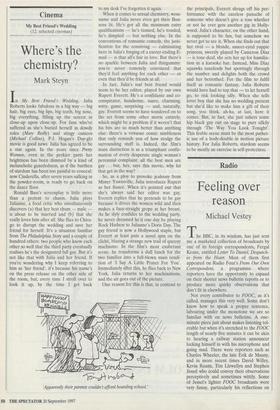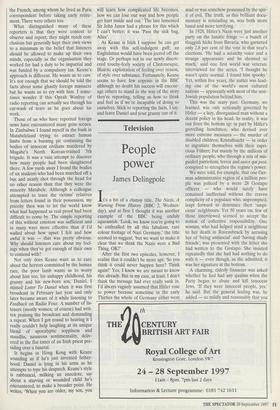Radio
Feeling over reason
Michael Vestey
The BBC, in its wisdom, has just sent me a marketed collection of broadcasts by one of its foreign correspondents, Fergal Keane, entitled Letter To Daniel, Despatch- es from the Heart. Most of them first appeared on Radio Four's From Our Own Correspondent, a programme where reporters have the opportunity to expand on their shorter news bulletin reports or to produce more quirky observations that don't fit in elsewhere.
Not every contributor to FOOC, as it's called, manages this very well. Some don't know how to speak a proper sentence, labouring under the monotone we are so familiar with on news bulletins. A one- minute piece just about makes listening tol- erable but when it's stretched to the FOOC length of nearly five minutes it can be akin to hearing a railway station announcer locking himself in with his microphone and going mad. There were reporters such as Charles Wheeler, the late Erik de Mauny, and in more recent times David Willey, Kevin Ruane, Tim Llewellyn and Stephen Jessel who could convey their observations perceptively and sometimes wittily. Some of Jessel's lighter FOOC broadcasts were very funny, particularly his reflections on the French, among whom he lived as Paris correspondent before taking early retire- ment. There were others too.
What distinguished many of these reporters is that they were content to observe and report; they might reach con- clusions but generally kept their own views to a minimum in the belief that listeners should be allowed to make up their own minds, especially as the organisation they worked for had a duty to be impartial and was funded by a compulsory tax. Keane's approach is different. He wants us to care. It's not enough that we should be told the facts about some ghastly foreign massacre but he wants us to cry with him. I some- times wonder if this Oprah Winfrey of radio reporting can actually see through his car-wash of tears as he goes about his work.
Those of us who have reported foreign news have encountered many grim scenes. In Zimbabwe I found myself in the bush in Matabeleland trying to extract human limbs from a burning pit containing the bodies of innocent civilians murdered by Mugabe's North Korean-trained 5th brigade. It was a vain attempt to discover how many people had been slaughtered there. A few yards away I found the bodies of six students who had been marched off a bus and neatly shot through the head for no other reason than that they were the minority Matabele. Although a colleague attempted to trace the victims' relatives from letters found in their possession, my priority then was to let the world know what had happened as real proof had been difficult to come by. The simple reporting of this without emotion was sufficient and in many ways more effective than if I'd wailed about how upset I felt and how awful it was — that was pretty obvious. Why should listeners care about my feel- ings when they've got enough of their own to contend with?
Not only does Keane want us to care about the horrors committed by the human race, the poor lamb wants us to worry about him too, his unhappy childhood, his granny and his new-born son, Daniel. I missed Letter To Daniel when it was first broadcast in February last year and only later became aware of it while listening to Feedback on Radio Four. A number of lis- teners (mostly women, of course) had writ- ten praising the broadcast and demanding a repeat. When I got round to hearing it I really couldn't help laughing at its unique blend of apocalyptic soppiness and maudlin, nauseous sentimentality, deliv- ered in the flat tones of an Irish priest pre- siding over a funeral. It begins in Hong Kong with Keane sounding as if he's just invented father- hood. Daniel is lying in his arms as he attempts to type his despatch. Keane's style is rabbinical, milking an anecdote, say about a starving or wounded child he's encountered, to make a broader point. He writes, 'When you are older, my son, you will learn how complicated life becomes, how we can lose our way and how people get hurt inside and out.' The late lamented Sir John Junor had a phrase for this which I can't better; it was 'Pass the sick bag, Alice'.
As Keane is Irish I suppose he can get away with this self-indulgent guff; an Englishman would have been jeered off the stage. Or perhaps not in our newly discov- ered touchy-feely society of Clintonesque, Blairite exploitation of feeling over reason, of style over substance. Fortunately, Keane seems to have few copyists in the BBC although no doubt his success will encour- age others to stand in the way of the story they're reporting, telling us how to think and feel as if we're incapable of doing so ourselves. Stick to reporting the facts, I say, and leave Daniel and your granny out of it.



































































 Previous page
Previous page